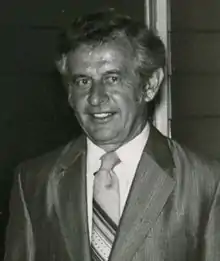John Wybrow
John Francis William Wybrow QSO (2 April 1928 – 29 July 2019) was a New Zealand politician and diplomat. He was the secretary of the Labour Party and later New Zealand's High Commissioner to Canada.
John Wybrow QSO | |
|---|---|
 | |
| 9th Secretary of the Labour Party | |
| In office 1971–1985 | |
| Preceded by | Allan McDonald |
| Succeeded by | Tony Timms |
| Personal details | |
| Born | 2 April 1928 New Zealand |
| Died | 29 July 2019 Hamilton, New Zealand |
| Political party | Labour |
| Spouse(s) | Nora |
| Children | 4 |
Biography
Wybrow was born on 2 April 1928 and was of the Roman Catholic faith.[1] He became an official working for the New Zealand Treasury.[2]
Wybrow became private secretary to Labour Party Leader Norman Kirk from 1968 to 1970. He was elected as the general secretary of the Labour Party in 1971, holding the position for fourteen years.[3] Kirk relied on him to 'carry the whole party constitution in his pocket'.[4] The two did not always get along as Kirk did not like Wybrow's tendency to act unilaterally, however he respected him for his energy and organisational ability. They commonly disagreed on the choice of candidates and Kirk blocked Wybrow from attaining the Labour nomination for Rotorua ahead of the 1972 election. Wybrow felt it was not for Kirk to decide these types of issues, to which Kirk retorted "I've got to lead the bastards you pick."[5]
When Kirk died in 1974, Wybrow lobbied for the candidacy in the by-election for his seat. However, party president Charles Bennett dissuaded him, saying that Labour couldn't afford to have both a new leader and new secretary start in the same year.[6] The selection committee was split 3 to 3 between Wybrow and Kirk's son John. The nomination ultimately went to Kirk after Labour's vice-president Gerald O'Brien switched his vote.[7]
After Bill Rowling was chosen as Kirk's successor as Prime Minister, Wybrow was among those who was unenthusiastic about the idea of holding a snap election under the guise of seeking a personal mandate for Rowling as Premier citing a lack of funding.[8] Wybrow stood unsuccessfully for the Miramar electorate in the 1975 election, losing to the incumbent National MP Bill Young by 1,749 votes.[9] In the attempted leadership coup against Rowling in 1980 by his deputy, David Lange, Wybrow was among those (such as Jim Anderton) who sided with Rowling.[10]
He retired from the role of party secretary in 1985 when he was appointed High Commissioner to Canada by the Fourth Labour Government.[11][12]
In the 1989 Queen's Birthday Honours, Wybrow was appointed a Companion of the Queen's Service Order for public services.[13]
Wybrow died on 29 July 2019. He was survived by three children.[14]
Notes
- Hayward 1981, p. 46.
- Grant 2014, p. 143.
- Bassett 2008, p. 556.
- Hayward 1981, p. 34.
- Grant 2014, p. 161.
- Hayward 1981, p. 312.
- Grant 2014, p. 420.
- Henderson 1981, p. 135.
- Norton 1988, p. 278.
- Hayward 1981, p. 19.
- "NZ's top job in Canada to John Wybrow". The Evening Post. 18 January 1985. p. 3.
- Bassett 2008, p. 145.
- "No. 51774". The London Gazette (3rd supplement). 17 June 1989. p. 33.
- "John Wybrow". Waikato Times. 31 July 2019. Retrieved 26 April 2020.
References
| Wikimedia Commons has media related to John Wybrow. |
- Bassett, Michael (2008). Working with David: Inside the Lange Cabinet. Auckland: Hodder Moa. ISBN 978-1-86971-094-1.
- Grant, David (2014). The Mighty Totara: The life and times of Norman Kirk. Auckland: Random House. ISBN 9781775535799.
- Hayward, Margaret (1981). Diary of the Kirk Years. Auckland: Reed Publishing. ISBN 0589013505.
- Henderson, John (1981). Rowling: The Man and the Myth. Auckland: Fraser Books. ISBN 0-908620-03-9.
- Norton, Clifford (1988). New Zealand Parliamentary Election Results 1946–1987: Occasional Publications No 1, Department of Political Science. Wellington: Victoria University of Wellington. ISBN 0-475-11200-8.
| Party political offices | ||
|---|---|---|
| Preceded by Allan McDonald |
General Secretary of the Labour Party 1971–1985 |
Succeeded by Tony Timms |
| Diplomatic posts | ||
| Preceded by Edward Latter |
High Commissioner to Canada 1985–1988 |
Succeeded by Bruce Brown |